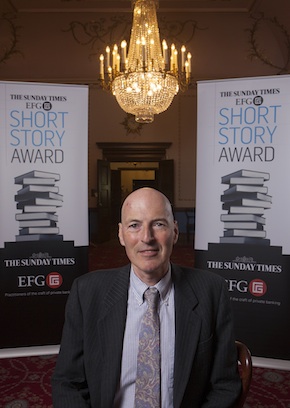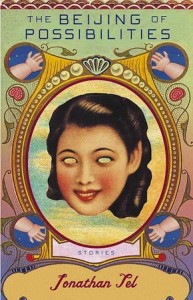Jonathan Tel: The great and the small
by Mark Reynolds
Jonathan Tel at the Sunday Times EFG Short Story Award prizegiving dinner © Tom Pilston
Jonathan Tel has won the 2016 Sunday Times EFG Short Story Award for ‘The Human Phonograph’, in which a woman is reunited with her geologist husband at a remote Chinese nuclear base in Qinghai in the early years of the Cultural Revolution. It’s a flashback moment in a series of interlinked stories that make up a wider novel about contemporary China.
The £30,000 prize, inaugurated in 2010, attracts entries from an extraordinary range of eminent writers from around the world, and Tel is the first British recipient. The previous winners are C.K. Stead, Anthony Doerr, Kevin Barry, Junot Diaz, Adam Johnson and Yiyun Li. I caught up with Tel at the awards dinner at Stationers’ Hall in the City of London, directly after the announcement and an electrifying reading from the story by Emily Watson.
MR: So how does it feel?
JT: Very pleasant! Like every writer, I sit on my own writing away, and it’s very gratifying to realise other people like your work too.
I had a great eyeline view of you listening as Emily Watson read from the story, and you seemed entranced.
She read it beautifully, yes. When I’m writing a story I do sort of mumble it aloud to myself, and I was pleased that is was very readable. In addition to her own talent, I tried to write it in a way that made it possible to be read.
This is the second sample from your novel-in-progress to have won a short story prize, after ‘The Shoe King of Shanghai’ won the 2015 Commonwealth Short Story Prize.
It’s the third, in fact.
All from the same novel?
Yes, I call it a novel, but one could equally call it a collection of linked stories.
That’s what I was leading to, because your previous book The Beijing of Possibilities was published as a story collection, but could also be classified as a novel.
It could, but who decides these questions, you know? The novel – as I think of it – is made up of short stories, but there are themes and overlapping characters, and there’s a kind of mystery plot. Somebody dies – whodunit? – and you find out in the last paragraphs. So there is an overall structure.
Is it finished?
Yes, it is. Will it get published? We hope so. My agent is looking into that, I think.
She may have a little more ammunition now.
She may well do, yes.
What drew you to write about the Cultural Revolution?
The book is mostly set in contemporary China. This story is a kind of little backstory within the novel. The heroine of the story, who we meet here as a young woman in the 1960s, is present later as an old lady who has a son who is a real-estate developer. The story ends with her becoming pregnant, and that foetus will become that son, who is alive and well in contemporary Beijing.
 How much time have you spent in China?
How much time have you spent in China?
Not as much as you might imagine from my knowledge of China, but it adds up to quite a lot, over many decades.
And you speak Mandarin?
Very badly. I read it – badly. I sort of know it quite well without speaking it. I understand it, I know a lot about it, and I know a lot about China. It’s a combination of diligence and intuition. I was working really hard to try and understand China, and at some point it becomes intuition, particularly when I make up a fictional character and have to imagine how they would behave and think.
Which Chinese writers do you particularly admire, and which of them were most helpful in approaching this book?
Li Yu was an extraordinary Ming Dynasty writer, he wrote erotic novellas. I don’t now about directly influencing me, but you become aware of the excitement and the sometimes transgressive quality of Chinese writing. There’s also a long tradition of writing horror stories and ghost stories in China. I’m not exactly writing horror and ghost stories, but there’s horror in there in some sense, and I’m aware of that behind my writing. And Chinese poetry too, effectively going back over thousands of years. I’m not writing directly in the Chinese tradition, but I’m writing with an awareness of it. Ideas of ghosts, reincarnation, the notion of self, the idea of what you can expect to get out of life. It comes out of understanding China perhaps, not just reading Chinese writing.
Writing a novel’s a bit like Physics. You understand the overall structure, and start with a very small thing, and starting at both ends somehow or other it will all link together.”
So why China?
Well I’ve been to other places too, but China is just so fascinating, I don’t understand why every writer in the world doesn’t write about China – or that’s what I feel when I’m writing about China. China’s interesting because of what’s going on now, but there’s also thousands of years of history that are so fascinating, and the two are connected. People in China are very much aware of their history, and they are linked to it. It’s also that if I’m writing something I want to pick the most important place in the world, and China’s the most important place in the world – certainly Chinese people think that. Anybody in Beijing knows that they’re at the centre of the world, they have no doubt about that whatsoever, and that gives me confidence. Where else would I write about? Here it is.
I was talking to a Chinese colleague recently who declared that Confucianism is a dead end, and that people are returning to Buddhism. Is that something you recognise?
When you look at the religion or philosophy in any culture, what people say they believe and what they actually believe are not at all the same. Someone in Britain may say they’re an atheist, but they’re a Christian atheist, they’re an atheist that comes out of a Christian culture. Richard Dawkins is a Christian atheist. Because he comes out of a Christian culture, his notion of so many things is related to Christianity. In the same way, in China somebody can say, “I don’t believe in Confucianism.” OK fine, but nevertheless their understanding of so many things will relate to that tradition: What is a government supposed to do? Why do we have governments? Who are we, and what kind of responsibilities do we have? What can we hope to achieve in a lifetime? These are questions there’s no answer to, but you understand them in the context of your culture, which is related to the prevailing religion.
How does your scientific background inform your fiction writing?
In Physics you learn that you can understand the universe in different ways. At the quantum level, you start with the smallest things in the universe, and when you understand the smallest you find something to understand that’s a bit bigger, and a bit bigger, and thus we hope to understand the whole universe eventually. The other way is you start from Cosmology, you start from the whole universe, and you say, OK I understand the big thing, now how do I get down to the small thing? But ultimately of course it’s one and the same universe, so the two should work together, the very small and the very big are connected. Well, writing a novel’s a bit like that. You understand the overall structure, and start with a very small thing, and starting at both ends somehow or other it will all link together. I do think in structures, I have diagrams and things marked x, y and z and arrows pointing when I’m writing.
So when did you flip from science to fiction?
I didn’t really flip. I began doing a PhD in Elementary Particle Physics and I ended up with a Masters Degree in it, and my PhD was in Philosophy and History of Science. Anybody who has written a PhD dissertation knows that it’s interesting at the first draft, but then when they tell you to do the next draft and the next draft and the next draft it gets really boring, and you think, “Ahh, I’m going to write something else,” and you stare at your computer and you think, “You know what, I think I’ll just write a novel instead.” So I sort of drifted into writing fiction, and then at some point I thought I should take it a bit more seriously, see if I can get something published.
So is fiction writing now your job?
Yes.
What are you writing next?
I have another idea on a subject of contemporary news interest, it’s again made up of linked stories, it’s kind of exciting for me, and again would involve immersing myself in another culture. But I think I’d rather not jinx it by giving you more detail.
 Jonathan Tel’s books include the story collection Arafat’s Elephant about Israeli and Palestinian storytellers, which was shortlisted for the PEN/Hemingway Award; the novel Freud’s Alphabet, and The Beijing of Possibilities, a story sequence that unfolds in contemporary China, which was shortlisted for the Commonwealth Writers Award. He was a finalist for the Sunday Times EFG Short Story Prize in 2014, and the winner of the 2015 Commonwealth Short Story Prize, for the companion story ‘The Shoe King of Shanghai’.
Jonathan Tel’s books include the story collection Arafat’s Elephant about Israeli and Palestinian storytellers, which was shortlisted for the PEN/Hemingway Award; the novel Freud’s Alphabet, and The Beijing of Possibilities, a story sequence that unfolds in contemporary China, which was shortlisted for the Commonwealth Writers Award. He was a finalist for the Sunday Times EFG Short Story Prize in 2014, and the winner of the 2015 Commonwealth Short Story Prize, for the companion story ‘The Shoe King of Shanghai’.
Qinghai Railway between Golmud and Tanggula Pass. Michel Royon/Wikimedia Commons
Read ‘The Human Phonograph’ at the Sunday Times EFG Story Prize website

